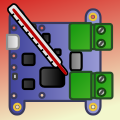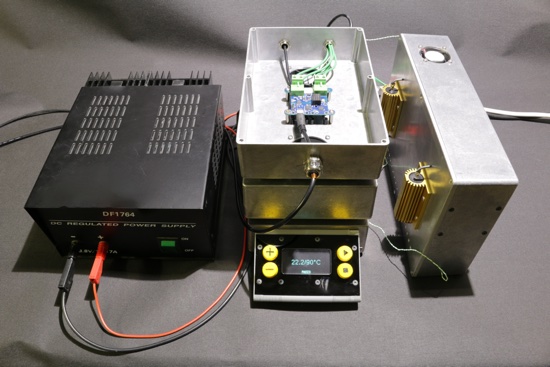 You may have noticed that until now our module specifications didn't include a working temperature range. This omission could seem strange, but we didn't want to give raw numbers without accompanying them with some explanations. Indeed, although most of the modules were designed for an extended temperature range, we hadn't had the opportunity to formally valid the theoretical temperatures. Thanks to the small system built two weeks ago, it's getting ready.
You may have noticed that until now our module specifications didn't include a working temperature range. This omission could seem strange, but we didn't want to give raw numbers without accompanying them with some explanations. Indeed, although most of the modules were designed for an extended temperature range, we hadn't had the opportunity to formally valid the theoretical temperatures. Thanks to the small system built two weeks ago, it's getting ready.
Normal temperature range and extended temperature range
Yoctopuce modules are first and foremost electrical equipment for measurement, control, and laboratory in the sense of the IEC61010-1 standard. The normal unavoidable working temperature, as per this standard, is from 5°C to 40°C. On this restricted temperature range, we expect that all the basic specifications are respected simultaneously: nominal accuracy, voltage and current measuring range for electric sensors, and so on.
Yoctopuce modules are nevertheless designed so that they can also be used on a more extended temperature range, even if it entails limiting some characteristics in extreme conditions. The ideal goal is to allow working on the whole range usually selected for industrial electronic components, that is from -40°C to 85°C. But to stay within reasonable technological solutions, we still had to sometimes compromise...
Let's see where the temperature constraints come from.
Electromechanical components
Plug connectors are typically a cause for limiting working temperature, because of distortions caused by the temperature, which can alter contact areas. In particular, micro-USB connectors are only guaranteed down to -30°C. Therefore, we can't guarantee any of our modules for temperatures below -30°C. Actually, you can work around this limitation by using a connector soldered to the 4 pads right behind the micro-USB socket, but this makes things more complex.
Other sensitive connector: the SIM-holder used in YoctoHub-GSM. Officially, it is guaranteed only between -20°C and 70°C. During our tests, it worked without trouble at 85°C for more than an hour, but we can't guarantee its behavior above 70°C if the manufacturer doesn't endorse it.
Other electromechanical components, such as relays, could have been susceptible to raise issues, but the models that we selected for our products are all designed for the industrial temperature range and therefore are not an issue.
Components dissipating heat
Components that must dissipate heat are susceptible to limit the working temperature, because a too high ambient temperature may not allow for the required dissipation. By selecting components designed to work with high temperatures, we avoid many problems, but high energy consumers, such as shunt resistors used to measure current are still problematic. For them, only one solution: to document the derating, that is the current limit depending on the ambient temperature. And for this, nothing better than testing in a controlled environment.
Resistors and capacitors
Resistors and capacitors can change value depending on the temperature. To avoid unpleasant surprises, we never use capacitors of a quality below X5R, nor resistors less accurate than 1%, for which the value won't vary in a significant way on the industrial temperature range. Some precise cases require components that are even steadier to guarantee the desired accuracy, as we will see below. But whatever the precautions that we take, nothing beats real-world tests to make sure that the conjunction of all these small mistakes doesn't prevent the module to work normally in the designed temperature range.
Other semi-conductors
Some sensors based on particular physical phenomena work only on a limited temperature range. It's the case for example for the sensor used in the Yocto-VOC and in the Yocto-CO2, and for the telemeter used by the Yocto-RangeFinder. For these cases, we don't have an alternate solution and must limit the extended use range to the range that the sensor supports, in the present case 0...50°C for air quality sensors and -20°C...70°C for the Yocto-RangeFinder.
The effects of the temperature on accuracy
Many Yoctopuce sensors are based on precision electric measurements. Strong variations in temperature can affect these measures at three levels: on the analog/digital converter, on the precision resistors used for the measures, and by the thermocouple effect at the junction points between the components and the printed circuit board.
The analog/digital converter error on the industrial temperature range is minimal, because we systematically use a quality component from Texas Instruments. The selection of precision resistors used varies from one product to the other, depending on cost/accuracy compromises that we had to make. For the most accurate products, such as the Yocto-PT100 and the Yocto-4-20mA-Rx, we use resistors with an accuracy of 0.01%, that have a variation depending on the temperature limited to a few ppm/°C. There are still errors introduced by the thermocouple effect, which are difficult to predict, but that we can easily take into account in a global quantification of the measuring error based on real-world tests on an extended temperature range.
For this type of sensor, we will therefore indicate not only the working temperature range and the nominal accuracy, but also the temperature coefficient, that is the error in ppm likely to be added by degree of deviation with regards to a nominal temperature of 25°C.

Yoctopuce device torture bench, made of... Yoctopuce devices
The tests
This first series of tests focused on high temperatures. We performed tests in our hot enclosure, first with a continuous temperature increase of a few degrees per minute, then for an hour at a temperature above 85°C. Except for one surprise, all the products behaved rather well. Here are the main results:
- First, the only unpleasant surprise: from 80°C and above, the Yocto-MaxiPowerRelay can disconnect itself from the USB bus if 3 relays or more are switched simultaneously. Fortunately, the issue was easy to solve and if you buy a Yocto-MaxiPowerRelay today, it won't have this problem anymore.
- No issue with the Yocto-PowerRelay however.
- Flawless operation as well for the Micro-USB-Hub-V2 at 85°C.
- No issue for the Yocto-PWM-Rx and Yocto-PWM-Tx. On the Yocto-PWM-Tx, we notice a frequency variation in the order of 100ppm/°C, but the duty cycle stays naturally constant. We nevertheless keep the idea of adding an oscillator to reduce the frequency variation in the next revision...
- The Yocto-4-20mA-Rx and Yocto-4-20mA-Tx behave very well. In particular, the accuracy of the Yocto-4-20mA-Rx stays excellent, with an observed temperature coefficient of less than 10ppm/°C.
- The Yocto-0-10V-Rx and Yocto-0-10V-Tx are also steady, with a temperature drift in the order of the announced accuracy.
- The Yocto-PT100 makes us proud, with a temperature coefficient so low that it's hard to observe it...
- The accuracy of the Yocto-Volt is also verified on the whole extended temperature range.
- The Yocto-Amp and the Yocto-Watt are less impacted than we feared by the rise of ambient temperature. The effect is not only negligible on the measurement accuracy, but the power derating is limited to 0,5A/°C, which makes it possible to use them at full power up to 67°C for the Yocto-Amp and up to 61°C for the Yocto-Watt.
- The YoctoHub-Ethernet works without any issue on the whole temperature range, including when using PoE. Note that the power available on PoE decreases slightly when the ambient temperature goes above 70°C. This will be documented.
- The YoctoHub-GSM-3G-EU worked without any problem at 85°C, despite the announced limitation of the SIM-holder.
All these observations are going to be compiled in details in the specifications of each product in the near future, as soon as we have performed additional measures in extreme cold. To be continued very soon...


